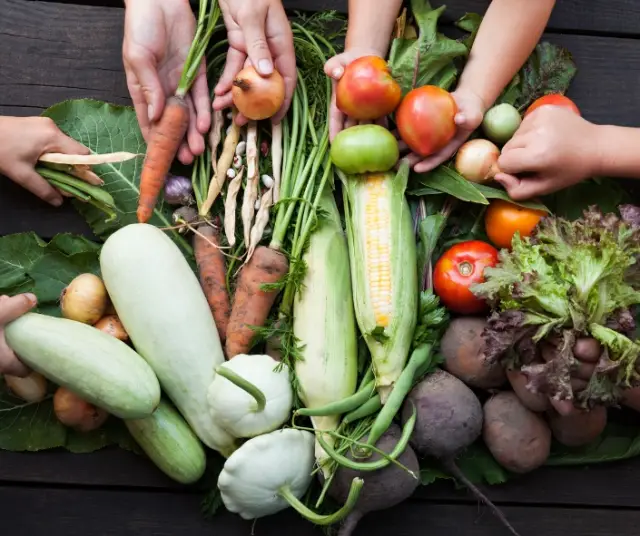In a world increasingly aware of environmental challenges, sustainable gastronomy has become a topic of increasing relevance. On "Sustainable Gastronomy Day ," we celebrate the union of cooking and environmental responsibility, exploring how our culinary choices can have a positive impact on the planet.
Sustainable gastronomy is not just about what is on our plate, but also about how that food gets there and how it affects the environment. At its core, it refers to food practices that seek to minimize negative impact on the environment, promote biodiversity, support local communities, and ensure equity throughout the food chain. This approach ranges from the production and distribution of food to the way it is consumed and wasted.
Fundamental Principles:
Responsible Sourcing:
The basis of sustainable gastronomy lies in the careful choice of ingredients. Sustainable chefs seek out local and seasonal products, thereby reducing the carbon footprint associated with transporting food over long distances. Additionally, they prefer organic ingredients and support agricultural practices that respect soil and water.
Zero Waste:
Sustainable gastronomy advocates the reduction of food waste. This includes the creative use of non-traditional parts of food, the implementation of preservation techniques and the efficient management of surpluses. Some sustainable restaurants have even adopted a "zero waste" philosophy, where every part of an ingredient is used in some way in cooking.
Water Awareness:
Water scarcity is a global concern, and sustainable gastronomy recognizes this by encouraging practices that conserve this vital resource. From agricultural production to cleaning utensils, sustainable gastronomy professionals seek to minimize water consumption and use it efficiently.
Animal welfare:
Ethics in animal production is an integral part of sustainable gastronomy. Priority is given to breeding methods that respect the well-being of the animals, avoiding intensive practices and promoting breed diversity.
Environmental Impact and Human Health:
Adopting sustainable gastronomic practices not only benefits the planet, but also human health. Consuming locally and sustainably produced foods often means greater freshness and nutritional quality. Additionally, reducing chemicals in food production contributes to the creation of healthier and more sustainable diets.
Innovation in Sustainable Cuisine:
Chefs play a crucial role in promoting sustainable gastronomy, and many are leading the way with culinary innovation. Creativity meets responsibility as you experiment with local ingredients, sustainable cooking techniques and presentations that highlight the beauty of food without compromising the environment.
Consumer Responsibility:
Consumers also play an essential role in promoting sustainable gastronomy. Making conscious decisions when purchasing food, preferring sustainable restaurants and reducing food waste at home are key steps towards building a more sustainable food culture.
Global Projects and Movements:
As awareness of the importance of sustainable gastronomy grows, various projects and movements are emerging around the world. From local initiatives that directly connect farmers with consumers to international movements seeking to change the way we produce and consume food, every effort counts in building a more sustainable food future.
Challenges and Opportunities:
Challenges:
Resistance to Ingrained Changes:
The food industry is often entrenched in traditional practices that can be difficult to change. From intensive agricultural production systems to established distribution methods, resistance to abandoning these established practices can hinder the transition to sustainable gastronomy. Education and awareness are key to overcoming this resistance and fostering a gradual but necessary transformation.
Limited Access to Sustainable Foods:
In some regions, access to sustainably produced food may be limited, either due to a lack of local supply or economic barriers. Promoting sustainable agricultural practices and creating distribution networks that directly connect farmers to consumers are important strategies to address this challenge.
Need for Public Awareness:
Consumer awareness is essential for the success of sustainable gastronomy. Many consumers are still not fully informed about the environmental and health benefits associated with choosing sustainable foods. Educational campaigns and outreach efforts are essential to increase public awareness and encourage growing demand for sustainable food options.
Economic Challenges for Small Farmers:
The transition to sustainable agricultural practices can pose economic challenges for smallholder farmers. Initial investment in sustainable methods and adaptation to new techniques often require significant financial resources. Government policies that support and facilitate this transition are essential to ensure that smallholder farmers can adopt more sustainable practices without suffering economic losses.
Opportunities:
Innovation in Sustainable Agriculture:
The search for more sustainable agricultural methods has led to innovation in food production. From vertical farming to agroecology, the industry is experimenting with approaches that are not only beneficial for the environment, but can also increase efficiency and productivity.
Technology and Traceability:
Technology plays a crucial role in promoting sustainable gastronomy. Advanced traceability systems allow consumers to know the origin of their food, promoting transparency throughout the food chain. In addition, technology facilitates the efficient management of food production and distribution, reducing waste and the environmental footprint.
Collaboration Strategies:
Collaboration between different actors in the food chain, from farmers to chefs and consumers, presents a key opportunity. Creating networks and partnerships can foster more sustainable practices, share knowledge and resources, and create a more equitable and efficient food ecosystem.
Recognition of Sustainable Certifications:
Sustainable certifications, such as organic, fair trade and others, are gaining recognition and trust among consumers. These certifications offer farmers and producers an opportunity to differentiate themselves in the market and establish clear standards for sustainable production.
Sustainable gastronomy is not simply a culinary trend, but a vital commitment to preserving our planet and feeding future generations. As we continue to explore new ways to enjoy food, let us remember that our gastronomic delight can coexist harmoniously with environmental responsibility.
